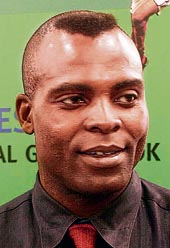|
|
HALF OF A YELLOW SUN By Chimamanda Ngozi Adichie,
Harper Perennial, £7.99
In a 2003 interview, Chimamanda Ngozi Adichie had asked aspiring African writers not to imitate John Grisham, but write their own stories. “And as you write a story, imagine that your parents and uncles and aunts and relatives will never read it...if you keep that in mind... you are more likely to write truthfully.” Truth is an important word for Adichie. What she tries to bring into her fiction is the force of “emotional truth” — an ineffable quality, “different from honesty and more resilient than fact”. She wants not to “explain” but to “show”. There are no moral pronouncements, nothing of the fiery post-colonial novelist-with-a-cause about her. Rather, there is a serene evenness in her prose, conveying a keen perception of Africa and its people rendered true to life by what Clifford Geertz had called “thick description”.
Adichie comes out of the tradition of modernist African literature initiated by Chinua Achebe and enriched by Buchi Emecheta, Elechi Amadi, Chukwuemeka Ike and others. In Half of a Yellow Sun, the Orange-Prize-winning second novel, after her critically acclaimed debut, Purple Hibiscus, Adichie returns to the theme that haunts most of her works, the Biafran War of 1967-70. She was born in 1970, the year the Republic of Biafra ceased to exist, and grew up in Nsukka, in a house once inhabited by her hero, Chinua Achebe.
Adichie grew up in the shadow of death left by the ‘African holocaust’ — both her grandfathers were killed in the war — listening to her parents, uncles, aunts and grandmothers recount the terrible days of massacre and mass starvation. But her literary consciousness is cosmopolitan instead of being parochial, furnished as much by her early encounter with Achebe’s Girls at War and Other Stories as by One Hundred Years of Solitude.
Half of a Yellow Sun is driven by the relentless force of this intellectual schizophrenia. Adichie’s prose is at once effortless and self-conscious; her luminous English is punctuated with bits of Igbo, pidgin English and local inflections. Her world is alive with parallels and paradoxes — bush people, Oxbridge-educated homegrown activists, servile but wily houseboys, canny politicians, foreigners from the far shores visiting their Africa of the mind. It is the last that Adichie writes at, making a “strongly-felt political point about who should be writing the stories of Africa”.
Adichie’s stories of Africa during the Biafran years are told through the lives of three characters — the houseboy, Ugwu, who works for Odenigbo, a lecturer at Nsukka University; Odenigbo’s lover, Olanna; and Richard Churchill, a young Englishman who is drawn to Igboland by the beauty of Igbo-Ukwu pottery.
The sections alternate between the early- and the late-Sixties, focusing intimately on a few men and women, whose lives are changed irreparably by tumultuous personal and political histories. As the unspeakable horrors of the war become a way of life, these people fall apart, becoming emotionally and geographically distant from one another. Ugwu is conscripted, Odenigbo employed in the war office, Olanna and her twin sister, Kainene, help out in refugee camps, and Richard becomes a correspondent, trying to counter the sensationalism of the Western press. The war drastically redefines values and priorities: Richard, who had come to Africa to write a book, falls in love with Kainene, marries her, and becomes involved in the nationalist cause. While Ugwu, the poor bush boy, educated by his Master, Odenigbo, finishes Richard’s work, The World Was Silent When We Died.
Adichie’s book is about self-forgetfulness, empathy and the desire to understand other people living in another time. Inatimi, a survivor of the war, is one of those unfathomable people from the past. “When I lost my whole family, every single one, it was as if I had been born all over again. I was a new person because I no longer had family to remind me of what I had been,” he says memorably. Wilfred Owen saw “the pity of war” in such people; Adichie considers them to be the “human face” of history.
Adichie also wants to turn certain faces towards the history of her country, which, she says, has been simultaneously loved and patronized by the West: “I feel that is a way a lot of liberal whiteness looks at African blackness. I don’t doubt the love…but I also often detect that there is something condescending about it.” Unlike the African writer, Emmanuel Egudu, in J.M. Coetzee’s Elizabeth Costello, there is nothing of the culture-vulture in Adichie. She compares the US to a “rich uncle”, who can’t always get the sophistication of her work but still gives her handsome pocket money. Her literary sensibility is highly calibrated, self-aware but not self-consuming. She knows that the African novel is not a novel about Africa: rather, the African Writer is a more composite phenomenon, one who is not burdened by history, but is more of a burden on history.












